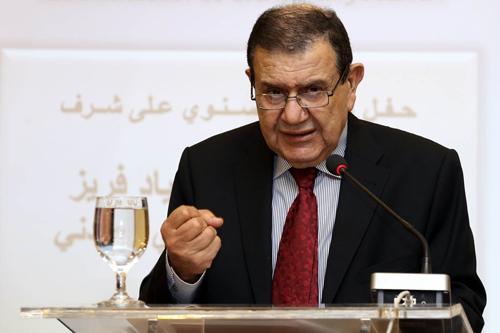You are here
GDP rate likely to improve this year — CBJ chief
By JT - Mar 02,2016 - Last updated at Mar 02,2016
AMMAN — Central Bank of Jordan (CBJ) Governor Ziad Fariz expected the national economy growth rate to remain around 2.5 per cent for 2015 and increase to around 3.2 per cent in 2016, the Jordan News Agency, Petra, reported on Tuesday.
The government expected the gross domestic product (GDP) to grow by 4 per cent in the 2015 budget law; however, the growth rate reached 2.6 per cent by the end of the third quarter of that year.
Speaking to board of directors' presidents and executive managers of banks around the Kingdom, Fariz said that the revenues of banks before taxes grew by 6 per cent in 2015, amounting to JD874 million compared to JD822 million in 2014.
He stressed the importance of cooperation among all stakeholders in the financial industry to achieve higher growth and better life conditions for the public, highlighting that Jordan’s condition is promising despite the tough conditions in the region.
The total assets of banks operating in the Kingdom increased more than the GDP, reaching 5 per cent, making the total amount of assets JD46.7 billion in 2015, Fariz said, adding that credit facilities grew by 10 per cent in 2015, compared to the year before.
The source of worry is the increasing rate of unemployment, he said, which amounted to 13 per cent, growing especially among young people.
The CBJ’s reserves of foreign currency increased to around $14 billion by the end of February, except for gold, Fariz said, noting that the overall budget deficit, both state and independent government agencies, was around 3.5 per cent in 2015.
The Kingdom also faces the problem of the increasing net public debt, internal and external, which constituted around 86.5 per cent of the GDP for 2015, according to the CBJ governor.
He added that the external net public debt service is almost insignificant in the balance of payments; however, the total public debt service is over JD1 billion a year, which constitutes a burden given its ration to the public budget.
Due to the unstable conditions in the region, there has been a decrease by 4.9 per cent in the tourism income in 2015, Fariz said, noting that expatriates’ remittances preserved acceptable levels of growth albeit lower than the figures recorded previously.
The dollarisation in the Kingdom has decreased to 16.9 per cent in January, compared to the 24.8 per cent it reached in 2011 which was the highest percentage, Fariz added.
Jordan’s reserves of foreign currency increased to JD14.153 billion, while the ratio of inflation decreased, as well as the budget deficit to 3.5 per cent compared to 8.3 per cent since the implementation of the economic correction programme, according to Fariz.
Related Articles
AMMAN — Central Bank of Jordan (CBJ) Governor Ziad Fariz said Tuesday that the national economy could restore the growth rates achieved in t
The Central Bank of Jordan (CBJ) lowered its basic interest rates twice in 2013 and 2014 with a total of 125 points, yet banks’ response to these procedures was not as expected in terms of credit facilities, CBJ Governor Ziad Fariz said.
AMMAN — Jordan will begin negotiating a new funding programme with the International Monetary Fund (IMF) this week to help boost its growth,
















